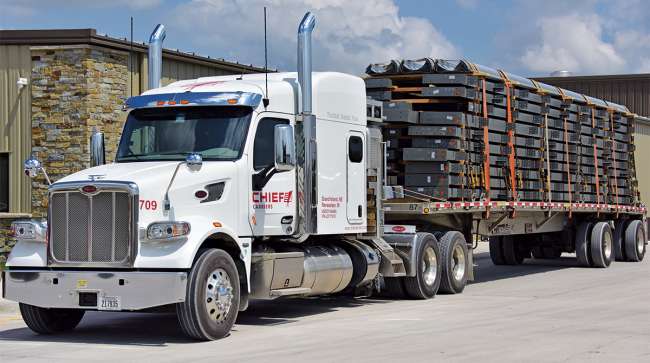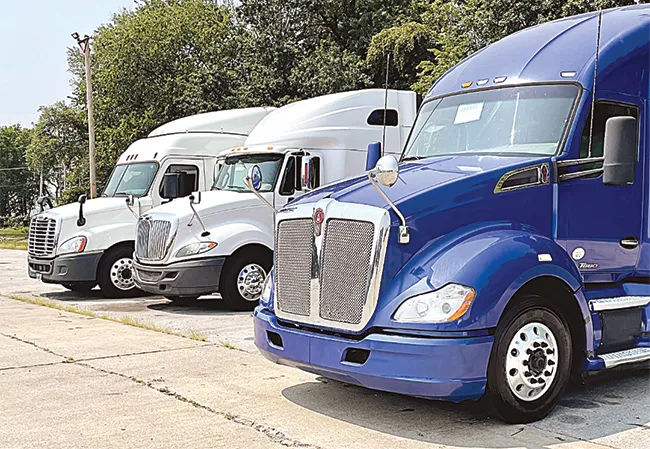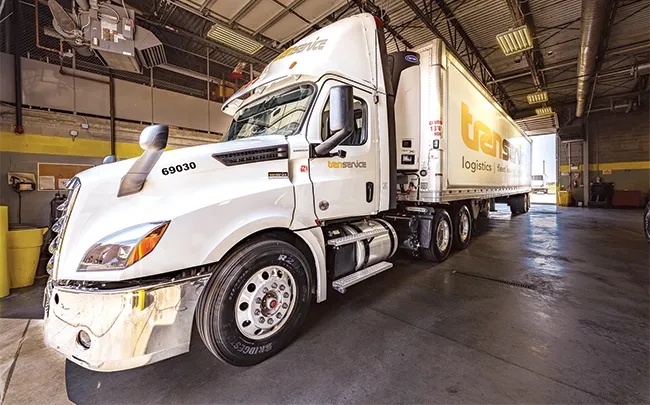Special to Transport Topics
Fleets Balance Risk and Reward in Truck Lease Agreements

[Stay on top of transportation news: Get TTNews in your inbox.]
For some trucking companies, a truck lease-purchase agreement could be a hit-or-miss event with long-term ramifications. However, industry leaders advised that if structured fairly, these leasing arrangements can be vital to the trucking industry.
At a meeting of the Truck Leasing Task Force in March, there was plenty of evidence shown of the bad lease-purchase offerings presented to trucking companies. The task force members, appointed by the Federal Motor Carrier Safety Administration, heard initial reports from the Consumer Financial Protection Bureau on how leasing agreements can skew unfairly toward benefiting the leasing company.
The CFPB reported concerning provisions in some of the contracts they reviewed, which could lead to a cycle of financial companies leasing and then recovering, just to lease the same truck again and again to drivers who never quite make enough money in the process to purchase the trucks they are trying to buy to establish their own businesses.
That is an inaccurate picture of most of the industry’s lease-purchase programs, said Jane Jazrawy, co-founder and CEO of driver training firm CarriersEdge.

Jazrawy
“The industry is kind of in the middle,” she told Transport Topics. “The FMCSA is looking at these lease-purchase programs with the view that they’re predatory, but at the same time, they’re also looked at as a perk and people ask for them.”
After reading through driver surveys from companies that are judged to be some of the best to drive for, Jazrawy says she sees a common theme.
“Drivers want lease-purchase programs. They look at those as a perk,” she said. Drivers want to make a career and have the flexibility of being an owner-operator, she said. “Carriers say that they have to offer a lease-purchase program because drivers will leave to go to someone else’s.”
Writing to the task force, the Truckload Carriers Association said independent operators play “a vital role in the American trucking industry” and that lease-purchase agreements are one of the financial tools that make that role possible.
“A leased truck offers exceptional freedom on the road,” wrote Jim Ward, TCA president. “Drivers can plan their routes and parking more adaptably as it promotes the independent contractor business model. Leasing a (commercial motor vehicle) may help a driver become an independent contractor, which TCA will continue to advocate.”
However, not all lease-purchase programs are created equal, according to the Owner-Operator Independent Drivers Association. OOIDA also supplied written comments on behalf of its members to the task force ahead of the July 18 meeting.
“Predatory truck-leasing schemes are one of many long-standing problems within the industry,” wrote Todd Spencer, president and CEO of OOIDA. “While traditional lease agreements can allow truckers to operate as independent small businesses, there is a subset of leasing arrangements that almost always exploits drivers.”
“People do all kinds of things, but it’s because there aren’t any rules to follow,” Jazrawy said. “People may have their own leasing companies; they may just kind of do it informally. There’s no model.”
She also noted three considerations in determining if a lease-purchase program is equitable for the driver: carrier commitment, entry requirements and education requirements.
“Carrier commitment is about what the carrier is doing for the driver,” Jazrawy said. “Is it a profit center or are you trying to create new owners? Are you doing it to expand the industry?”

Industry leaders say that lease-purchase agreements depend on carrier commitment and establishing proper entry requirements. (OTR Leasing)
Companies with favorable driver feedback don’t push lease-purchase agreements when conditions are unfavorable, she said. “When equipment prices are really high and freight loads are low, there’s no point in doing it because there’s no chance of success.”
Next, she said, companies should focus on entry requirements when evaluating lease-purchase programs.
“If you just let anyone come and buy one of your trucks, you don’t know if they’re going to be successful or not,” Jazrawy said. The best programs have requirements that drivers have a certain length of time with the company, have good safety and on-time scores, and other factors.
She also said carriers should have some form of ongoing education for potential owner-operators — making sure they are able to understand the ramifications of business taxes, filing requirements and maintenance responsibilities, as well as the terms of their lease agreement.
“In the successful programs, drivers have to go through financial management training and coaching and talk to someone over a long period of time,” she said. “Just like you do safety coach coaching: It’s financial coaching.”

Winkler
Andrew Winkler, general manager at Chief Carriers Inc. of Grand Island, Neb., told TT his company started its lease-purchase program in recent years.
“We really approached it from a recruiting standpoint,” he said, noting the company was getting many calls from potential drivers asking how the company’s program was structured. “It’s really a hot thing with the drivers now. They want that independence; they want to become that small business operator.”
Winkler noted that the carrier did not want to miss out on the pool of quality professional drivers; however, he wanted to make sure the program was structured in such a way that it resulted in a high number of owner-operators, and not a high number of returned trucks.
“It’s our responsibility, not just to throw them the keys across the counter and say, ‘Here you go, good luck,’ but to teach them about what it’s like to run a small business and how that’s different from being a company employee,” he said.
Winkler said drivers at Chief Carriers are not eligible for the lease-purchase program until after completing a certain length of service with the company. At that time, the drivers complete an education program, making sure they understand the ramifications of being an independent contractor. Winkler explained that it is a process of getting to know the driver to see if they are a good fit for the fleet and if they have the proper skill set necessary to run that small business on their own.

For most fleets, lease-purchase programs have been structured to reduce the number of returned trucks and improve driver retention. (Transervice Logistics)
“One of the things I ran into early on in my career with these lease programs was that drivers were living paycheck to paycheck and trying to make as much money as they could, as fast as they could,” he noted. “Many of them saw the lease programs and thought it was a way just to get rich quick, and it absolutely is not that.”
As a result of carefully structuring the lease program, Winkler said the company has seen driver retention increase significantly. Combined driver turnover for the company for the past 12 months was approximately 36%; but among drivers who were in the lease-purchase program, that turnover was 25.9%.
He said he hoped to see some sort of framework established to create minimum requirements for drivers.
“There’s a lot of the programs out there that make it too easy for entry, so it’s no money down, no credit checks, you know ... long as you got a CDL, we’ll slide you in the seat of a truck,” he said. Additionally, the equipment the programs are pushing drivers into can be very expensive to operate and maintain, creating further challenges for drivers to meet the terms of the lease.
Jeff Loftus of FMCSA joins TT’s Seth Clevenger to discuss the current outlook on ADAS technology and how it will affect the industry at large. Tune in above or by going to RoadSigns.ttnews.com.
Chief Carriers requires a small down payment along with the education commitments. The company also tries to push drivers into trucks that are affordable to operate and maintain.
“I think the lease-purchase model is really critical to the industry as a whole. If it would happen to go away, I think we’d be in real trouble as far as being able to provide enough capacity,” Winkler said.
OOIDA’s Spencer wrote to the task force that the organization believes, after interviewing members, that some programs create conditions that are difficult for drivers to find success in. He pointed out that some programs allow carriers to control terms of the drivers’ business, including load assignments, working conditions and other costs associated with the leasing agreement, such as where maintenance can be performed.
“Although there are federal leasing regulations in place that should protect individuals from these scenarios, the rules are hardly ever enforced. The truth-in-leasing rules are designed to prevent the abuse of owner-operators, but in what other industry can you start a business with no money, no credit, no nothing, and end up in a lease agreement that will put you in debt,” he wrote. “In our view, there is insufficient federal oversight on these types of agreements.”
Want more news? Listen to today's daily briefing above or go here for more info
Winkler said he thinks the task force and FMCSA have a long road ahead when it comes to policing the issue and doesn’t think federal oversight is necessarily the answer.
“The whole idea of more government, I’m not in favor of that,” he said, adding the industry might be able to come up with guidelines of its own to prevent predatory lending practices.
“I like the idea of maybe a certification through [American Trucking Associations] or TCA to help protect the drivers and to make sure that the carriers that are doing [lease-purchase agreements] are structuring them in such a way that the drivers are going to be successful at it,” Winkler noted.




